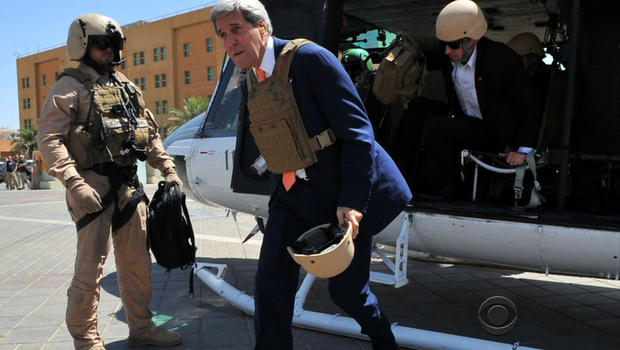Kerry's Middle East mission had extra sense of urgency
Iraq was the focus of Secretary of State John Kerry's just-completed diplomatic mission to the Middle East. Margaret Brennan was there and has this reporter's notebook.
WASHINGTON - Traveling with the secretary of state always has a sense of urgency to it, but this trip had a different level of intensity.
In part, because of the rush to stop the fast-advancing radical Sunni insurgents from seizing territory in Iraq.
Anxiousness about that threat became obvious in the high level of security. Two stops in Iraq were kept secret.
In Baghdad, Kerry flew in via U.S. military plane. And unlike our last trip here, Kerry wore a helmet and flak jacket.
Inside the fortress-like U.S. Embassy - the largest U.S. diplomatic post in the world - it feels almost empty. Almost all of the non-essential staff has been moved to safer posts, some outside the country.
In meetings with Iraqi leaders, Kerry was emphatic: The U.S. would not act as their air force, a political solution was necessary.
He stopped short of asking Prime Minister Nouri al-Maliki to step down, even though al-Maliki is seen as an obstacle to forming a new unity government. That complicated Kerry's pitch to leaders in northern Iraq, who refused to work with al-Maliki.
Kerry maintained a grueling schedule, visiting six cities in five days.
Kerry's job in Paris was to convince Arab ministers to persuade the Iraqi government to do what's necessary to quell the violence. They're concerned it could spill over their own borders.
The last stop was in Jeddah, where he consulted with King Abdullah of Saudi Arabia, the single most important voice among the Gulf nations.
The hope is that the king will help persuade Iraqi leaders to follow through on their pledge to form a new government as early as Tuesday.

